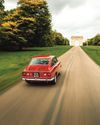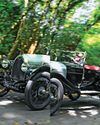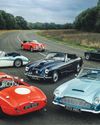
A ccording to one executive who was there at the time, selling the idea of small cars to the bosses of America's 'Big Three' makers - those imperious men in the teakpanelled offices of Ford, General Motors and Chrysler - was a hopeless task. "Small cars mean small money," explains George Gallion, who held managerial positions in the design offices of GM for four decades, confirming that the smaller the car, the smaller the profits.
Logically, then, big cars mean big money. As a result, year after year, product planners and marketers preferred to push new luxury land yachts to the dealers, almost always larger, more powerful and more ostentatious than those that had come before them.
In the end, however, it would be the local customers themselves who forced a change in attitude. Compact imported cars, and above all the Volkswagen Beetle, began to populate America's streets from the 1950s. While their share of the market grew every year, the number of US-produced vehicles in this segment steadily declined, dropping to below 7% by the late 1960s. This was the moment for the Big Three manufacturers to launch their retaliation.
'Detroit fights back' was the coverline of Newsweek magazine on 6 April 1970, accompanied by an image of a quirky little car with a truncated tail (above right). With sales starting on 1 April (an unfortunate choice, bearing in mind the reputation the car would later gain), the underdog American Motors Corporation was ahead of the Big Three with its new Gremlin, stealing a six-month march on Ford and GM, which wouldn't launch their own compact cars -the Pinto and the Chevrolet Vega respectively - until the late summer. Chrysler was even further behind. AMC quickly secured buyers with what was then the cheapest domestically produced car, priced at $1879.
この記事は Classic & Sports Car の August 2024 版に掲載されています。
7 日間の Magzter GOLD 無料トライアルを開始して、何千もの厳選されたプレミアム ストーリー、9,000 以上の雑誌や新聞にアクセスしてください。
すでに購読者です ? サインイン
この記事は Classic & Sports Car の August 2024 版に掲載されています。
7 日間の Magzter GOLD 無料トライアルを開始して、何千もの厳選されたプレミアム ストーリー、9,000 以上の雑誌や新聞にアクセスしてください。
すでに購読者です? サインイン

RAY HILLIER
Double-chevron oddity proves a break from the norm for this Crewe specialist

SHORT BACK & GLIDES
Eccentric enthusiast Captain RG McLeod's series of Manx-tailed Bentley Specials reached its zenith with this unique S2 Continental.

People's choice
The diminutive but multi-million-selling Fiat 850 packed a remarkable diversity of form and function into its compact footprint

PLASTIC BREAKS FROM THE NORM
Glassfibre revolutionised niche car-body production, but just occasionally strayed into the mainstream.

A SENSIBLE SUPERCAR
The cleverly conceived four-seater Elite secured Lotus a place at the big players' table, but has it been unfairly maligned since then?

"I had a habit of grabbing second place from the jaws of victory"
From dreams of yachting glory to the Le Mans podium, via a stint at the top of the motorsport tree, Howden Ganley had quite the career

Still going strong
Herbert Engineering staked its reputation on the five-year warranty that came with its cars. A century on, this Two Litre hasn't made a claim

One for the kids
General Motors was aiming squarely at the youth market with the launch of the Pontiac GTO 60 years ago, and its runaway success popularised the muscle-car movement

A NEW BREED OF HERO
Launched at the turn of the millennium, the GT3 badge has already earned a place alongside RS, CS and turbo in Porsche lore.

Brits with SIX appeal
The straight-six engine is synonymous with a decades-long legacy of great British sports cars. Six variations on the sextet theme convene for comparison